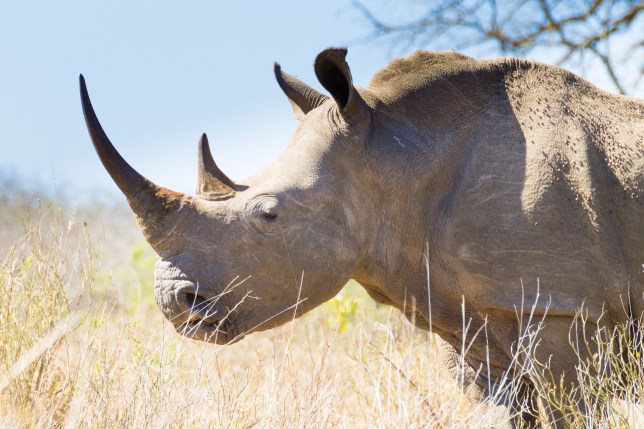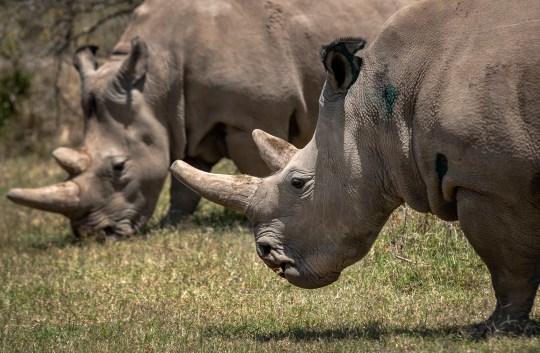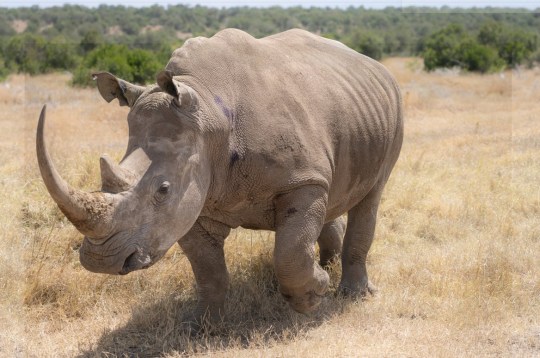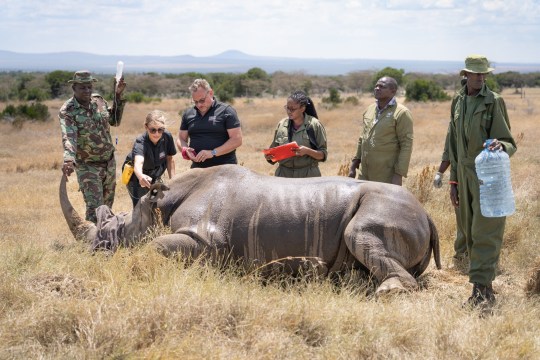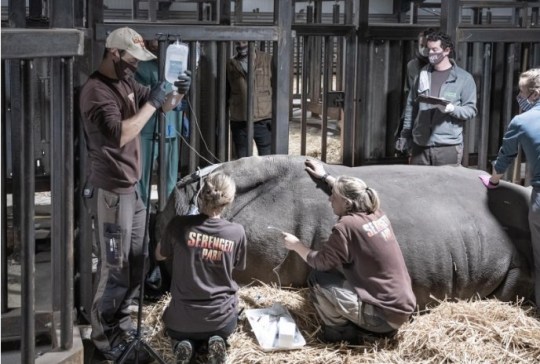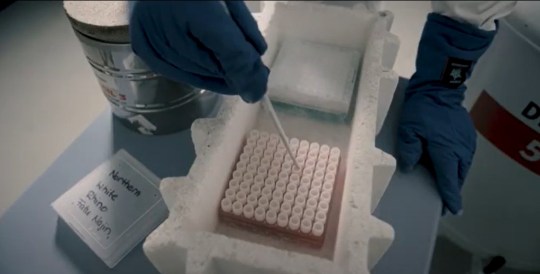There are only two northern white rhinos left on the planet, but we may have moved a step closer to saving their species.
Thanks to breakthrough fertility treatment, scientists have successfully achieved rhino IVF by transferring a lab-created embryo into a surrogate mother.
The ability to implant fertilised eggs into surrogate rhino mums will be essential if the species is to be saved, because the only two animals left, Najin, 34, and her daughter Fatu, 23, are both infertile.
The last male northern white rhino, Sudan, died in 2018.
However, frozen in liquid nitrogen are 30 northern white rhino embryos, stored in Europe and awaiting their moment for when the technique is perfected. They were created using eggs from Fatu and sperm from two northern white rhinos, collected before they died.
The recent successful IVF procedure was carried out in a closely related subspecies, the southern white rhino.
‘To achieve the first successful embryo transfer in a rhino is a huge step,’ said Dr Susanne Holtze, a scientist at Leibniz Institute for Zoo and Wildlife Research (IZW) in Germany. The organisation is part of the Biorescue project, an international consortium behind the trial.
Speaking to BBC News, Dr Holtze said: ‘But now I think with this achievement, we are very confident that we will be able to create northern white rhinos in the same manner and that we will be able to save the species.’
This requires another scientific leap – implanting an embryo from one subspecies into another – but the team is confident it can work.
‘I think the situation for the northern white rhino is quite privileged for the embryo transfer because we have a closely related recipient – so their internal map is nearly the same,’ said Professor Thomas Hildebrandt, project head for the Biorescue Consortium.
And aside from the unknowns of the cross species pregnancy, the physical logistics of implanting the egg is not easy either.
Dr Holtze said: ‘It’s very challenging in such a big animal, in terms of placing an embryo inside the reproductive tract, which is almost two metres inside the animal.’
It took the team 13 attempts to achieve a successful pregnancy, in an international operation combining an egg from a female in a Belgian zoo with sperm from a male rhino living in Australia, implanted into the surrogate in Kenya.
Sadly, despite the successful pregnancy, the trial did not end with a live calf. Tragedy struck when a mudslide hit the rhino’s enclosure, bringing with it a deadly dose of Clostridia bacteria in the soil.
But a post-mortem revealed the 70-day pregnancy was progressing perfectly, and the foetus had a 95% chance of being born alive. Rhino pregnancies last 15 to 16 months.
Despite the sad outcome in this case, it proved the procedure could work, sparking hope for saving the endangered northern white rhino.
Rhinos have been around for 26 million years, and have few predators in nature. However, poaching of the animals, primarily for their ivory horns, has resulted in the complete eradication of the sub-species in the wild.
Najin and Fatu remain under close watch in their home at the Ol-Pejeta Conservancy in Kenya.
And while some argue that the vast sums of money being spent to revive a species that is all but extinct could be better used protecting those with a bigger chance of survival, the team behind the project disagrees.
BioRescue’s Jan Stejskal told BBC News: ‘One thing that we have to understand is that behind the extinction of the northern white rhino is man.
‘It’s not because of some evolutionary pressure, it was greed, it was the consumption of a rhino horn.
‘So, in a way, we are responsible and if we actually have a technique that can assist us to save them, then I think we have a responsibility to use it and to try to save them.’
MORE : Brexit has ruined sex life of endangered rhinos and big cats, warn zoos
MORE : Critically endangered black rhino calf born at UK zoo
MORE : Rare black rhino dies while being flown 7,000 miles from UK to Tanzania
Get your need-to-know
latest news, feel-good stories, analysis and more
This site is protected by reCAPTCHA and the Google Privacy Policy and Terms of Service apply.

